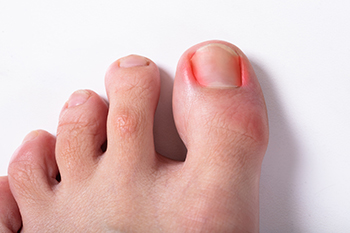

An ingrown toenail is easy to notice. The side of the toenail grows into the skin instead of over it. It can be quite uncomfortable, and in severe cases, may bleed, and become infected. It can happen for a variety of reasons, such as wearing shoes that do not have enough room in the toe area, having endured a toe injury, or from trimming the toenails improperly. Genetic reasons may contribute to getting an ingrown toenail, and this may account for people who naturally have curved toenails, or have toenails that are too large for their toes. Common symptoms that are associated with ingrown toenails include redness, swelling, and pain. The affected toe may temporarily feel better when it is soaked in warm water, which can soften the nail. This may make it easier to pull the skin away from the toe, despite the fact it may not last. If you have an ingrown toenail, there is a chance it can become infected, and it is strongly advised that you consult with a podiatrist as quickly as possible who can offer professional treatment.
Ingrown toenails may initially present themselves as a minor discomfort, but they may progress into an infection in the skin without proper treatment. For more information about ingrown toenails, contact one of our podiatrists of Grand Blanc Family Footcare. Our doctors can provide the care you need to keep you pain-free and on your feet.
Ingrown Toenails
Ingrown toenails are caused when the corner or side of a toenail grows into the soft flesh surrounding it. They often result in redness, swelling, pain, and in some cases, infection. This condition typically affects the big toe and may recur if it is not treated properly.
Causes
You are more likely to develop an ingrown toenail if you are obese, have diabetes, arthritis, or have any fungal infection in your nails. Additionally, people who have foot or toe deformities are at a higher risk of developing an ingrown toenail.
Symptoms
Some symptoms of ingrown toenails are redness, swelling, and pain. In rare cases, there may be a yellowish drainage coming from the nail.
Treatment
Ignoring an ingrown toenail can have serious complications. Infections of the nail border can progress to a deeper soft-tissue infection, which can then turn into a bone infection. You should always speak with your podiatrist if you suspect you have an ingrown toenail, especially if you have diabetes or poor circulation.
If you have any questions, please feel free to contact our office located in Grand Blanc, MI . We offer the newest diagnostic and treatment technologies for all your foot care needs.